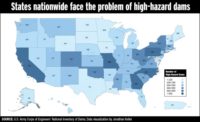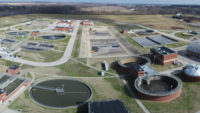More than 160 sustainability consultants, clients and stakeholders from 70 companies and 15 industries gathered to explore issues related to building with sustainability and resilience at the recent Environment Analyst Global Business Summit 2023 in Chicago
Speakers addressed issues, including how to better work with clients to build more sustainable and resilient projects, how to gain community support for projects they will embrace and the importance of quantifying sustainability efforts.
Hollie Janson Schmidt, director, resilient + sustainability advisory at Jacobs, told attendees at the June 27-28 event that many clients are interested in building more sustainably and with resilience but they need to be encouraged to consider the benefits beyond financial rewards.
“What we typically see is that there are many, many benefits of constructing more sustainably and resiliently,” she said. “It just takes the right business case analysis to prove that out. And I also think it takes a shift from just looking at cost to looking at value … There are the financial aspects of value, but there are also non-financial values, and it is those non-financial values that we really are trying to focus on.”
She said the non-financial values that clients need to consider include items such as health, wellness, community relations, air and water quality, and brand perception.
We want to “expand our focus beyond the return on investment to the return on perception,” she added.
Project elements that support sustainability and resilience also need to be introduced early in the stages of a project because “that’s where you are most likely to get funded, supported, championed and implemented,” she said. “If you come in [later] and say ‘How can we be more resilient and sustainable’ [the response may be] ‘There’s not budget for that. There’s not time for that.’ You’ll get a lot of resistance.”
Quantifying the impacts of building more sustainably was addressed by Rodrigo Fernandes, director of ES (D) G for Bentley Systems.
One example he shared is Bentley’s iTwin Experience, which enables infrastructure professionals to quantify carbon reduction opportunities in their projects, to automate embodied carbon reports and impact analyses, and to explore multiple design choices faster and eliminate data exports and normalization.
“We want to enable users to implement carbon analysis and optimization as a natural, repeatable and standardized procedure, as part of managing every type of infrastructure project, anywhere in the world,” Fernandes said.
Technology that enables better quantification is already being used, he added.
Echoing Schmidt, Fernandes said the sooner that tools for quantification of sustainability or resilience are used in projects the better.
“The sooner that carbon assessment is integrated into an infrastructure project, the bigger the carbon reduction opportunities will be,” he said.
The date and place location for next year’s conference will be announced shortly, organizers said.



.jpg?height=200&t=1669066791&width=200)


Post a comment to this article
Report Abusive Comment